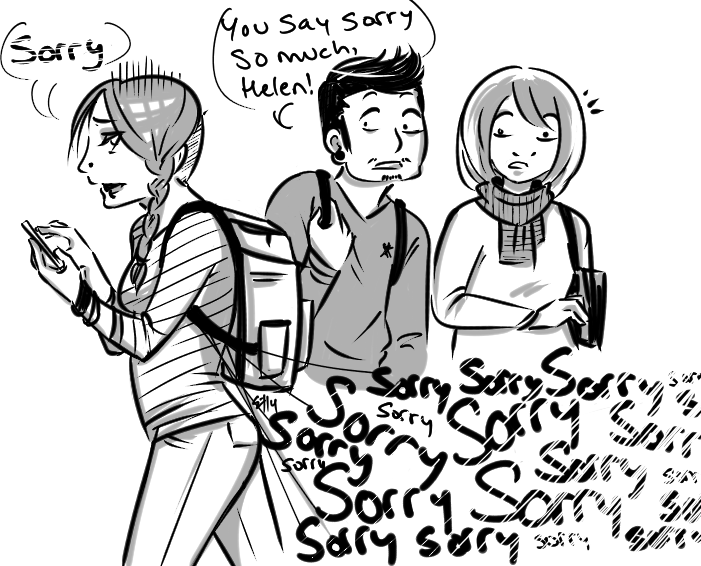I call back a friend after missing her call. “Hey, I’m sorry I didn’t pick up the phone, I had my volume off.” My elbow bumps the elbow of the person sitting next to me. “Oops. Sorry.” My friends get into my car after I’ve been at work. “Sorry it smells like farm in here, I haven’t had the chance to clean it out.” It has become a reflex we exercise so often we fail to regard it with actual awareness. We act, apologize and repeat.
Continuously apologizing is a sign of one of two things. Either one is apologizing when it isn’t warranted, or, and this is less likely but possible nonetheless, one is a not-so-fantastic person.
Making the assumption that, in general, we are okay people who aren’t repeatedly hurting others, it stands to reason that our society apologies in situations that warrant no such action. To find an appropriate equilibrium, we must first recognize why we apologize and then make deliberate choices in deciding which situations deserve apologies.
For starters, we shouldn’t have to consistently apologize for our slight imperfections. I am terrible at making plans. Ask me what time my next class starts and unless the answer is “right now,” it’s likely I’ll respond with a deer-in-headlights look. I have trouble parallel parking. I wait until the last possible day to wash my laundry. I have to have ice in my drinks. These irksome imperfections hardly make me a bad person. It’s not my intention to cause anyone harm and any inconvenience I impose on others is more than likely only noticeable after I apologize. There is no gain in apologizing for the small faults in our personalities and doing so in a repetitive manner only belittles us over time.
We shouldn’t apologize in situations simply because we have no other words. Maybe I took a bit longer than expected to reply to a text, I shouldn’t be expected to reply with, “sorry it took so long, I was in the shower.” It seems that we apologize in these types of situations in order to acknowledge that we didn’t act as was expected of us. No harm is done in these situations, but without that apology it is suggested we aren’t aware of our surroundings. There is hardly a call to arms. If others expect us to explain our every move, their disappointment should be associated with their expectations, not our actions.
Even when we do feel guilty for our role in a situation, there still may not be sound reason to apologize. For example, say I’m walking to D.H. Hill and in my arms are my laptop, a copy of Franny and Zooey, a lab manual and a cup of coffee. I can’t exactly open the door myself and sure it’s no one’s fault but my own that I rushed there and didn’t pack my things properly, but when the nice boy opens the door for me, need I be apologetic? I feel guilty I made him jog up the stairs to help me, but perhaps this nice boy would appreciate a “thank you” or “I appreciate it” more than “sorry.” An awareness and appreciation of the actions others take in response us is not only less self-centered, but probably better received.
Published in Scientific American, researchers have found a positive correlation between individuals with low self-esteem and low apology rates, as people with higher self-esteem feel more confident in acknowledging errors made. However, individuals with too high self-esteem and egocentric tendencies also have trouble apologizing.
Once conscious of the situation, if one truly and honestly feels there is a founded reason to apologize, it is of course necessary and proper to do so. But before we run around throwing apologizes around like bang snaps on the Fourth of July, perhaps we should consider the occurrences that brought us there.
Were the circumstances under our control? Are we apologizing for our personalities? Did we mean to inflict unnecessary discomfort? Does it really warrant an apology?
If incessant apologizing continues to be the societal norm we choose to perpetuate, there will come a time, if it is not already upon us, when an apology means nothing more than a shallow acknowledgement that things did not go as planned or is simply a filler in a situation we don’t know how to address.
An apology shouldn’t be an indicator of how polite one is; it should a sincere and hopefully rare occurrence that carries weight and significance.








